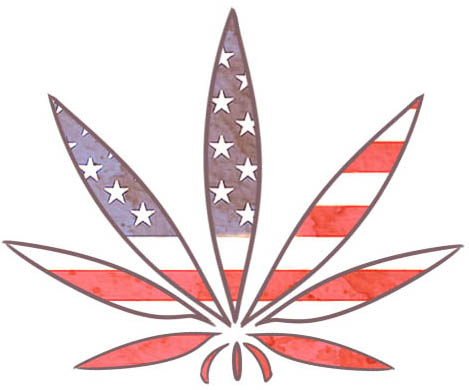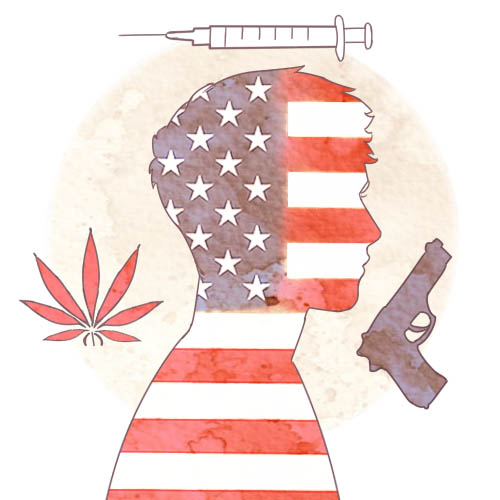One often overlooked feature of the transition into fall is that Americans receive their annual opportunity to influence state policy by voting on propositions. This November, Californians will have to sift through an unusually long list of propositions due to a record low voter turnout in the 2012 election, which paved a much easier path to the ballot for the prospective laws. However, when faced with a potentially staggering 18 propositions, which may be overwhelming to first-time voters, people ought to resist the urge to throw up their hands and declare the effort futile.
This year’s list, which covers a broad range of issues, ranging from plastic bag usage to healthcare reform, includes a few key propositions that hold the potential to revolutionize our criminal justice system. Californians certainly ought to take advantage of their chance to weigh in on some of our nation’s most controversial issues, including the death penalty, gun control, and the legalization of recreational marijuana, which are addressed by propositions 62 and 66, 63 and 64, respectively.
The death penalty (Prop 62 and 66):

Proposition 62 would repeal the death penalty and make the most drastic punishment for convicted felons life in prison without the chance for parole. This would apply retroactively, changing the punishment for those already on death row. Another proposition, Proposition 66, directly contrasts and is mutually exclusive with Proposition 62. By putting the state Supreme Court in charge of the initial petitioning process this initiative would keep the death penalty in place while aiming to streamline the petitioning process for those appealing for lesser sentences. If both propositions are approved, whichever one receives the most affirmative votes will become law.
“There are multiple reasons why it would be good to replace the death penalty [with life in prison without the chance for parole],” Nick McKeown, death penalty activist and professor of electrical engineering at Stanford University, says. “We’re obviously not putting people on death row on the streets, as they’ve all been found guilty of very severe crimes.”
Whether one is driven by morals or pragmatics, McKeown argues, passing Proposition 62 is aligned with the people’s interests. “The biggest indicator of whether you’ll go to prison or not is if you’re poor, black and male,” McKeown says. “Poverty has a very high correlation with imprisonment.”
The consequences of such correlations, which can be dire for minority populations, are literally life or death in this case.
“It’s obvious … that there are many many unresolved biases,” McKeown says. “The criminal justice system and capital punishment is just one very stark manifestation of that. It’s where there can be an appearance of a process which emboldens people who have those intolerances to use … and almost hide behind that process.”
Some argue that while a correlation may exist between socioeconomic status and execution rates, proponents of Proposition 62 have yet to prove a causal relationship.
According to the Department of Justice, whites comprised 58.9 percent of defendants to be executed in California in 2012, with blacks comprising only 36.6 percent.
“The image that activists try to create is that the district attorney sits in front of a stack of files and chooses the … prisoners to execute,” says Raymond Fang, a junior at Palo Alto High School and a police cadet in the Redwood City Police Department. His training and work as a cadet, which bear striking similarities to the responsibilities of full police officers, prepares him to enter the field of law enforcement at an earlier age. “That is not the case at all. Opponents either got their facts wrong or misinterpreted it [the data]”
While passing Proposition 62 would not eliminate racism in the criminal justice system, it would certainly mitigate its consequences, according to McKeown.
“If any [prisoners] are innocent and we find out later, at least we can let them go or revisit the case,” McKeown says. “Clearly if they’re executed, we can’t do that. For many of us, regardless of what we think of capital punishment, it’s shocking to kill an innocent person, whereas you won’t execute an innocent person if the death penalty was replaced with life in prison without parole.”
Despite arguments that the justice system has been susceptible to flaws in the past, supporters of Proposition 66 argue that the best way to solve problems is through reforming, rather than abolishing the system.
“No DA would want to put an innocent life to death,” Fang says. “The solution is not abolishing the death penalty, for a compromise can be made. With the death penalty in place, we can increase vigilance in determining innocence and prosecuting the right people. We can have moderators … and guidelines for the judges to determine an undeniable verdict.”
For those concerned with practicalities, Proposition 62 could also be seen as a money guzzler.
“Keeping someone in the prison system, especially for life, is extremely costly,” Fang says. “America is in trillions of dollars in debt already, and spending billions a year housing certain inmates that are a lost cause for rehabilitation purposes is pointless.”
On the other hand, reforming the system would only take more money, exacerbating the budgetary strain.
“It’s so expensive to provide … the legal resources to go through a proper sequence of appeals and review just to make sure that we don’t execute an innocent person,” McKeown says. “Review processes are there for a reason. Unfortunately, what Proposition 66 does is that it removes those safeguards—[it] is pro capital punishment and increases executions.”
However, some argue that life in prison without parole fails to provide sufficient retribution and does not adequately ensure the public’s safety.
“If these people are just going to get let out every 6 months or year, and destroy more people’s lives, it would be in the greater interest to make sure that doesn’t happen again,” Fang says.
Gun control (Prop 63):

The recent controversy surrounding gun control has been brought up on the California ballot through a measure that aims to make communities safer, which has been endorsed by Palo Alto’s Vice Mayor, Greg Scharff. This proposition would require individuals to pass background checks and obtain Department of Justice approval to purchase ammunition. Said ammunition would also be purchased through licensed vendors and be reported to the Department of Justice, while any unauthorized sharing of ammunition would become a crime.
According to Safety for All, a pro-Proposition 63 organization, Prop 63 will improve public safety through closing status quo loopholes to prevent criminals and the severely mentally ill from using lethal weapons.
For the sake of public safety, the prospective law prohibits large-capacity ammunition magazines (containers used for storage and feeding of ammunition) and requires those in existence to be disposed of properly. However, not everyone agrees with this assessment of the proposition.
“With these [restrictions], the right to defend yourself just becomes the right to bring your gun to the range and shoot,” Fang says. “Making people pass background checks just to buy bullets takes the power to defend one’s life and family away, as there are many people with negligible prior offenses.”
The measure would also provide for a new system where lost and stolen firearms must be reported to the police while also prohibiting those who have been convicted of stealing guns from ever possessing firearms in the future.
Marijuana legalization (Prop 64):

The movement to legalize marijuana has been gathering support for over a decade, this upcoming ballot being the second since Proposition 19 in 2010, which proposed to decriminalize possession of marijuana for those over the age of 18. Proposition 64 would legalize the recreational use of marijuana by adults, create a 15 percent sales tax on marijuana, establish government agencies to license and regulate the industry, and allow for the expungement of criminal records pertaining to minor, marijuana-related offenses.
Marijuana has already been legalized in Washington, Colorado, Oregon, Alaska and the District of Columbia. While our national government still lists marijuana as a Schedule 1 controlled substance and punishes the usage thereof accordingly, these states have begun to develop the fledgling industry.
“Last year, law enforcement arrested 8,800 Californians for marijuana usage,” Jason Kinney, spokesperson for Yes on 64, says. “They also created criminal misdemeanors for 6,600 juveniles, half of which were Latino, essentially ruining their lives over something which many experts agree has possible medicinal benefits.”
Proposition 64, which would legalize and regulate marijuana, also allows the state government to tax previously underground transactions.
“There are a lot of benefits from a system that taxes and regulates marijuana instead of criminalizing it and pretending that it doesn’t exist,” Kinney says. “A regulated structure that involves taxed marijuana allows the state to finally start offsetting the burdens of the billion dollar industry. It’s not a choice between marijuana or no marijuana, we already have marijuana everywhere and most is grown illicitly.”
In addition to gaining tax revenue over time, Kinney argues that cost-cutting will begin immediately.
“The passage of Proposition 64 will save state tens of millions of dollars right off the bat, because we’ll no longer have to arrest, prosecute, and incarcerate nonviolent marijuana offenders,” Kinney says.
While Proposition 64 grants law enforcement officers (and budgets) a welcome respite, it also alleviates unnecessary pressures on minority communities becaue many arrested for marijuana related crimes are from communities of color.
The proposition also provides historically oppressed communities with reparations, dedicating up to 50 million dollars of tax revenue per year to help job training programs, Kinney says.
This November, if Proposition 64 passes, its proponents will certainly celebrate the success, but the journey is far from over.
“It’s not about marijuana, and it has never been about marijuana,” Kinney says. “It’s always been a fear tactic and a tool to criminalize certain communities… The majority of funding for Proposition 64 has come from groups that have no interest in the marijuana industry, but they do care about social justice.”
On the other hand, there are organizations like Citizens Against Legalizing Marijuana, who believe that the effects of legalizing marijuana would be detrimental.
“For every $1 collected in taxes on alcohol and tobacco, almost $14 is spent to repair the vast social damages caused by their use,” Carla Lowe, a representitive of CALM, says. “Legalization of marijuana will see a similar effect.”
Lowe went on to explain many of the adverse side effects that marijuana can have on people.
“A lot of people think that pot is harmless… but it can cause health problems including cancer of the head, nose and throat, and is a major cause of testicular cancer in young men,” Lowe says.
With this wide range of influential propositions, this election will surely be one of the most important to date.

